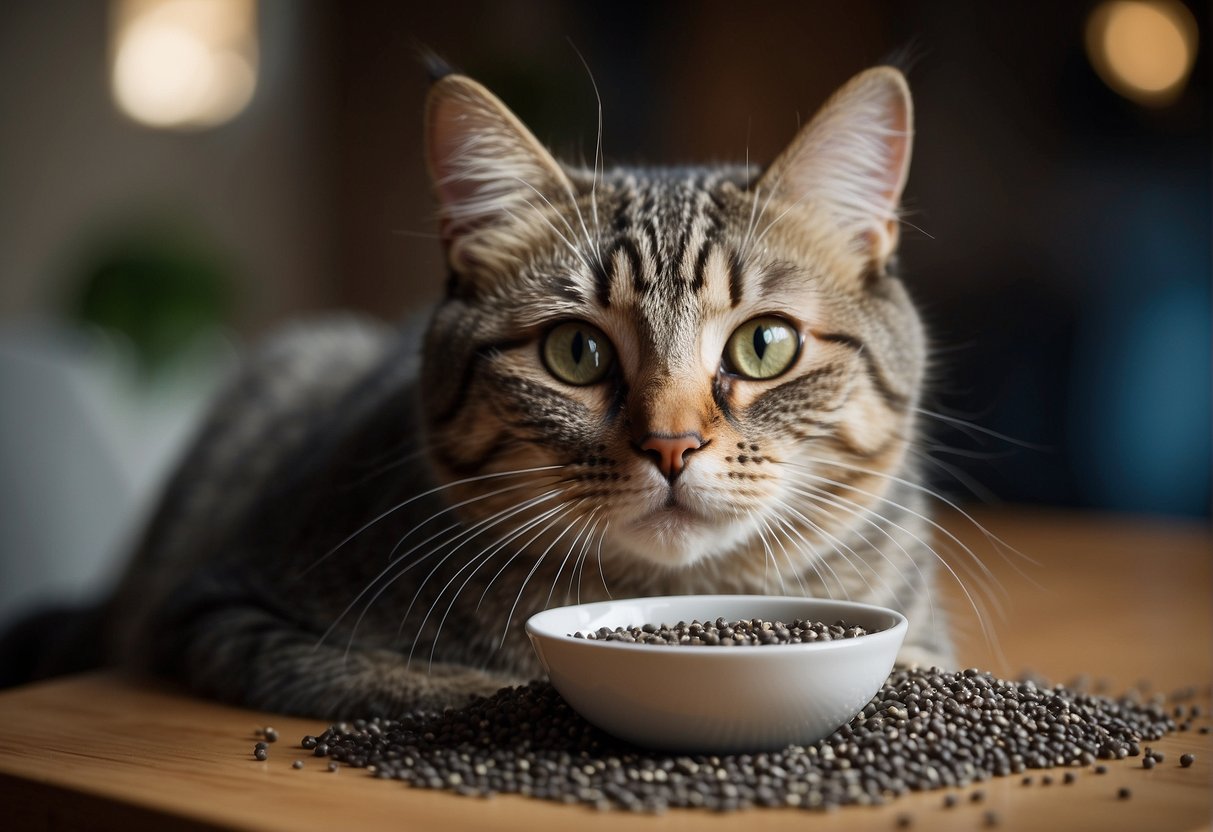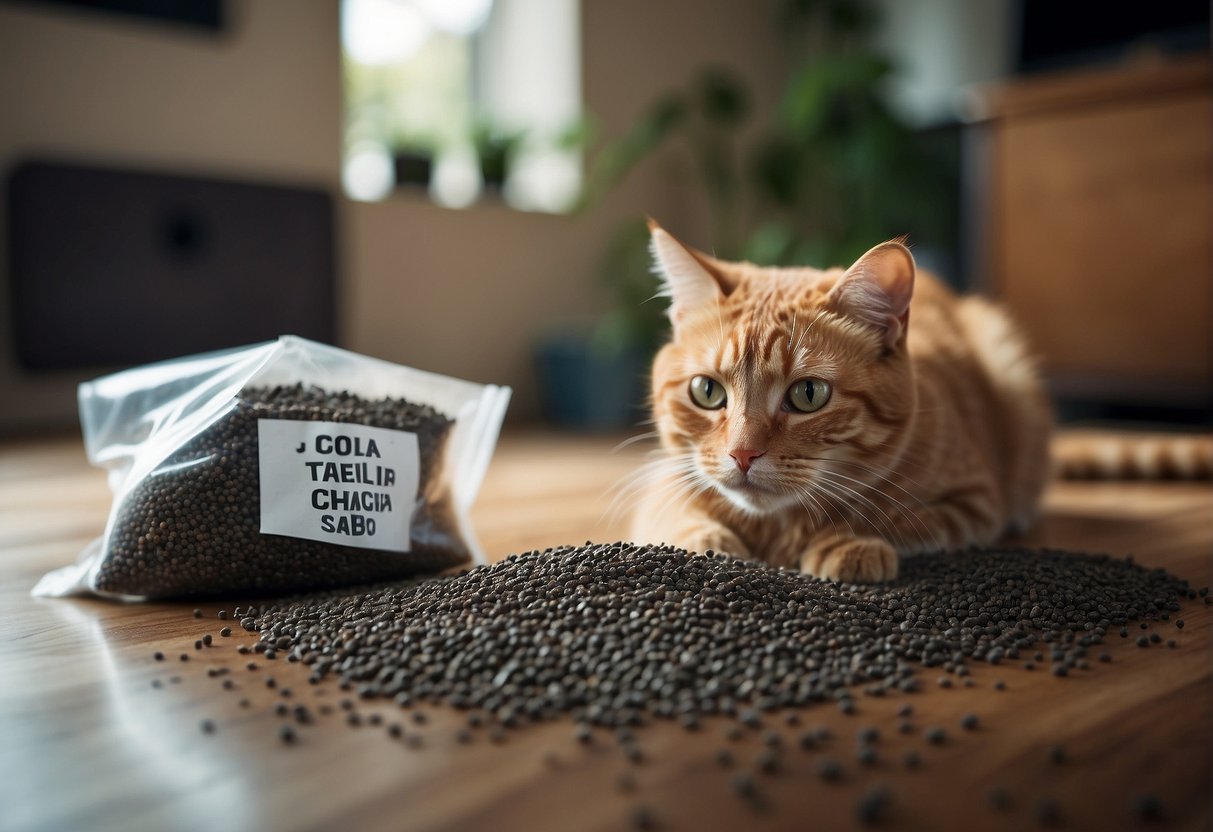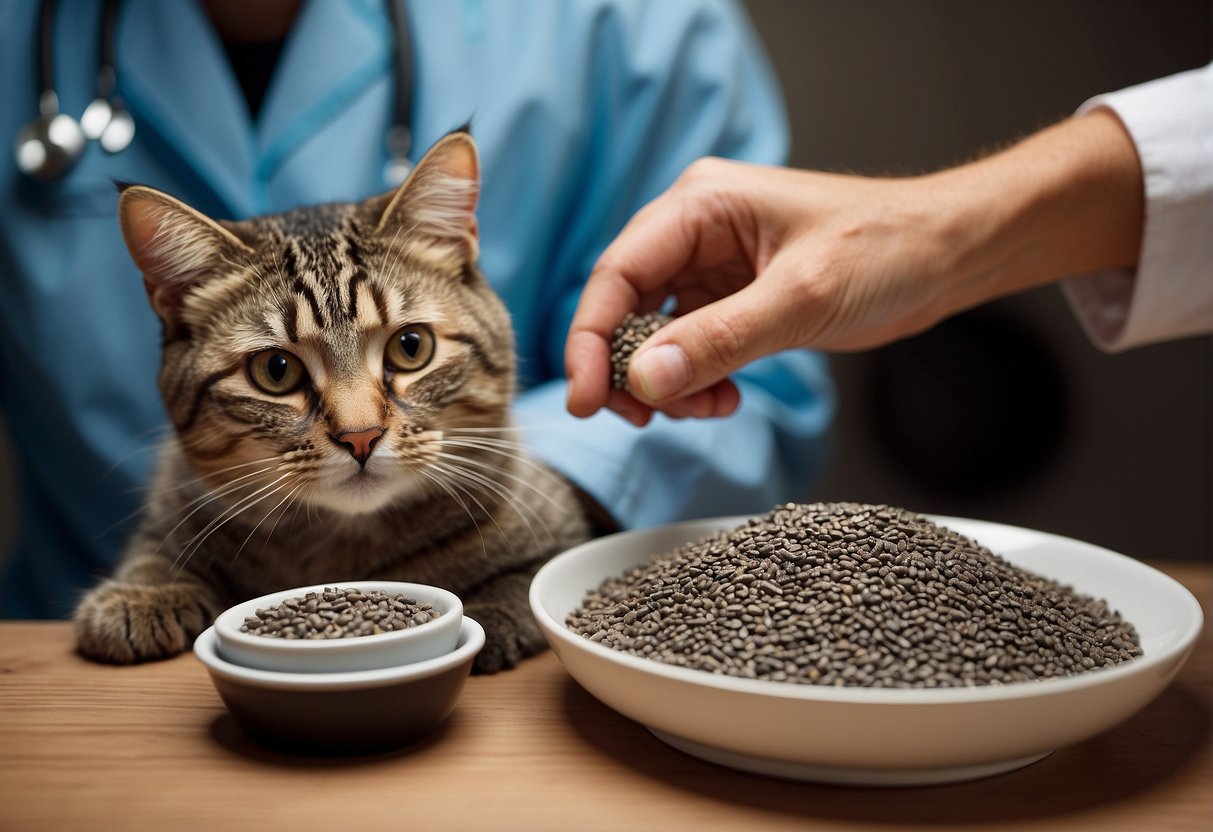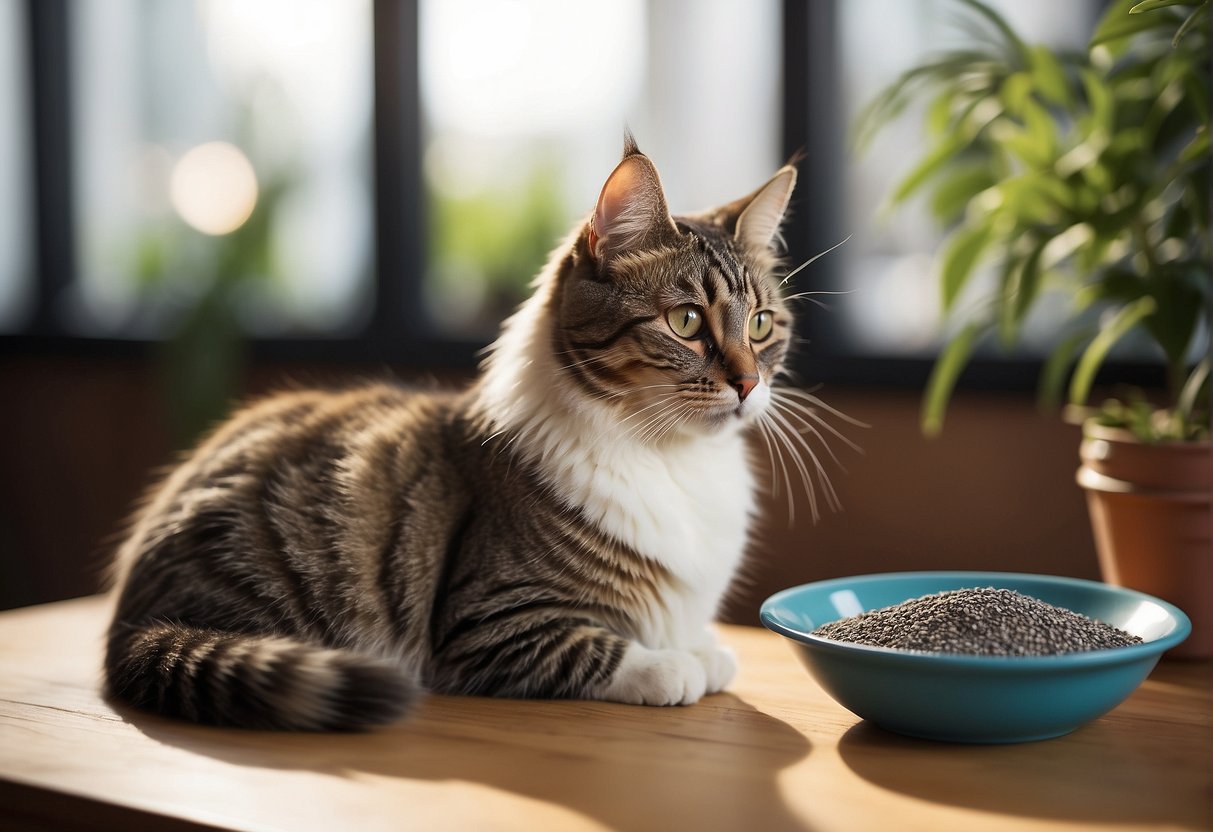When it comes to pampering our feline friends with new treats, the safety and health benefits are paramount.
You might have heard about the superfood status of chia seeds for humans but have you ever wondered if can cats have chia seeds and enjoy the same healthy boost?
Chia seeds, these versatile seeds, are not just a human health fad; they’re rich in omega-3 fatty acids, packed with fiber, and a great source of antioxidants.
If you’re contemplating adding a sprinkle of these nutritious and versatile seeds from health food stores to your kitty’s diet, you’re barking up the right tree.
Chia seeds can help keep your cat’s coat in top condition like hemp oil benefits to cat, along with helping out with any inflammation issues, avoiding constipation, and diarrhea.
In short answer, yes, cats can eat chia seeds.
While cats typically rely on a meat-based diet, they might still benefit from the occasional plant-based nutrient boost, especially if it’s as nutrient-dense as chia seeds.
These tiny seeds can potentially fill some gaps in your cat’s nutrition, offering a supplement that’s high in fiber and calories.
Chia seeds are high in vitamins A, B3, and B12, as well as minerals zinc, potassium, and thiamine. (1)
They also contain a variety of 18 different amino acids, all of which are required for proper development and growth. Chia seeds can help protect your cat from diseases like cancer and heart disease.
Before you make any changes to their diet, it’s always best to seek advice from a vet who can provide tailored recommendations for your whiskered companion.
However, it’s important to remember that cats are obligate carnivores, so their primary source of nutrition should come from meat.
Key Takeaways
- Chia seeds are safe for cats and provide a nutritious boost, being high in omega-3s, fiber, and antioxidants.
- They can potentially fill nutritional gaps in a feline’s diet, complementing their meat-centric nutrition.
- Always consult with a vet before integrating new foods like chia seeds into your cat’s diet for personalized advice.
Comprehensive Health Benefits of Chia Seeds for Cats

Let’s talk about how chia seeds can be a great addition to your cat’s diet. You might be looking for ways to bolster their health, and these tiny seeds are jam-packed with goodness!
Nutritional Components and Their Effects
Chia seeds are like little nutrition bombs, especially beneficial for your purring pal.
- Omega-3 Fatty Acids:
Chia seeds are a plant-based source of these heart-healthy fats which can help keep your cat’s fur silky and shine. (2) - Fiber:
Great for the digestive system, fiber in chia seeds can aid your cat’s bowel movements. - Protein:
Vital for muscle health, chia seeds are a surprisingly good protein source. - Calcium and Magnesium:
These are the building blocks for strong bones, which become increasingly important as your cat ages. (3)
Are you noticing your senior cat’s coat looking a bit dull?
Chia seeds could help — think of them as a natural coat conditioner from the inside out.
Age and Breed Specific Benefits
For your senior cats, these seeds can provide an energy boost and support their aging joints.
And for those majestic long-haired breeds, chia seeds might just be the secret to managing those lush locks.
| Nutrient | Benefit for Cats |
| Calcium | Supports bone health |
| Magnesium | Aids in muscle function |
| Protein | Maintains muscle health |
| Fiber | Promotes digestion |
Remember, like any new food, introduce chia seeds into your cat’s diet gradually to watch for any adverse reactions.
Including chia seeds as a treat for your cat can offer numerous health benefits, yet moderation in cat treat is crucial to prevent any potential digestive discomfort or nutrient imbalances.
Your fluffy friend’s tummy will thank you for not going overboard!
Risks and Safety Considerations

While these seeds are generally safe for cats, it’s crucial to be aware of potential risks regarding seeds to cat and introduce them carefully to your whiskered companion.
Understanding Potential Risks
Just like with any new food, your cat could experience digestive upset. Their bodies aren’t used to these new seeds!
And although chia seeds, which come from two different plants, the Salvia hispanica plant and the Salvia columbariae, are small, in large quantities they might lead to blockages in your pet’s digestive system. (3)
So, moderation is key! Here are a few guidelines to help you introduce chia seeds cautiously to your pet’s digestive system.
Consult with your regular veterinarian about the precise amount of chia seeds from the Salvia hispanica plant and the Salvia columbariae to add to your cat’s meals based on their body weight. (4)
The exact formulation and frequency will likely depend on the size of your kitty, their nutritional needs, and the specific regulations in Guatemala.
- Start small: Give your cat a tiny amount of chia seeds initially.
- Observe: Watch for any signs of digestive discomfort.
- Increase gradually: If all seems well, you can slowly increase the amount.
How to Identify and Respond to Allergies
What if your cat is allergic to chia seeds?
Keep an eye out for unusual symptoms such as itching, swelling, or gastrointestinal upset. Should you notice anything amiss, here’s what you can do:
- Stop feeding chia seeds: Immediately eliminate chia seeds from their diet.
- Consult your vet: Get professional advice to manage any allergic reactions.
- Monitor your cat: Keep a watchful eye on any further symptoms or changes in their health.
Remember, you know your furry friend best. If you’re in doubt about feeding your cat chia seeds or notice anything unusual, consulting with your vet is always your best bet!
Ensuring the safety and happiness of your purring pal doesn’t require a superhero cape, just a sprinkle of caution and a dash of love.
So, go ahead, introduce those chia seeds slowly and enjoy the potential benefits they may hold for your cat’s health.
Incorporating Chia Seeds into Your Cat’s Diet

Chia seeds might just be the ticket. They’re packed with omega-3 fatty acids and can help give your cat’s coat that glossy sheen!
But before we become too excited, let’s chat about the best way to introduce chia seeds into your cat’s meals, such as mixing them with a small amount of beef broth.
Chia seeds can absorb up to 12 times their own weight, making them a great addition to your cat’s diet.
Practical Feeding Guidelines:
Making chia seeds a part of your cat’s diet is simple. First off, have you got a quarter teaspoon at the ready?
That’s the sweet spot for a daily portion size to start with.
- Slow and Steady:
If you’re wondering how to serve them up, here’s a quick idea – mix chia seeds with a bit of wet cat food!
Tutorial on Making a Chia Seed Treat:
- Homemade Goodness:
Try a homemade chia seed cat treat. Create a paste by soaking chia seeds in water, then blend it into their favorite food. It’s both nutritious and a fun variation for their palate.
Tips on Portion Size:
- Portion Control: Stick to about 1/4 teaspoon per day to avoid overfeeding.
Monitoring and Adjusting:
- Watchful Eye:
Keep an eye on your cat after introducing chia seeds. How are they handling the new addition? - Tailored Diet:
Remember, every cat is unique! Adjust the amount based on your cat’s size, age, and health.
Smaller or less active cats might need less, while larger or more active furballs may benefit from a bit more.
So there you have it! A sprinkle here, a mix there, and you’ve enriched your cat’s diet. Just remember to keep an eye on how they’re taking to the change and adjust as necessary.
Who knew such tiny seeds could make such a big difference? Happy feeding!
Expert Opinions and Veterinary Recommendations

Chia seeds and the chia plant, also known as chia grass, might just be on the menu.
According to some veterinarians, adding a sprinkle of chia grass to your cat’s digestive system may bring some shiny benefits, particularly due to their omega-3 fatty acid content, which is essential for optimal health.
However, it is important to note that cats may also eat chia grass to ease sore throats or induce vomiting when they have an upset stomach or digestive tract issues.
The cat’s digestive system plays a crucial role in processing and eliminating indigestible materials, such as small animals, and chia grass can aid in this process.
Expert opinions and veterinary recommendations suggest considering the inclusion of chia grass in your cat’s diet.
Professional Advice on Chia Seeds:
Veterinary insights suggest that while chia seeds are not a staple of a traditional cat diet, they are generally considered safe and potentially beneficial in small amounts. Here’s what you might hear during a vet visit:
- “Chia seeds can contribute to a healthy skin and coat for your cat, thanks to the omega-3s.“
- “Always introduce any new food gradually to prevent gastrointestinal upset.”
Research and Case Studies:
Studies highlight the impact of omega-3 fatty acids on pets, particularly their effect on coat quality and joint health.
A study’s summary might note:
- “Cats consuming diets enriched with omega-3 fatty acids showed improved skin and coat condition.”
Friendly reminder, though—everything in moderation.
Give your cat tiny amounts and see how they react before making it a regular addition.
If you’re thinking about using chia seeds to give your cat a nutrition boost, here’s a quick reference table:
| Nutrient | Benefit to Cats |
| Omega-3 fatty acids | May improve skin and coat health |
| Fiber | Aids in digestive health (5) |
| Protein | Supports overall health and wellbeing |
Remember, your vet knows your cat best. Before adding anything new to their diet, it’s always wise to have a little chat with them.
After all, they’re on your team when it comes to keeping your feline feeling fabulous.
Quick Recap

Have you ever wondered if those tiny chia seeds you sprinkle on your breakfast are okay for your feline friend?
You’re in luck because chia seeds are not only safe for cats, but they come with a bundle of health perks!
Nutritional Benefits:
- Omega-3 Fatty Acids: These are great for your cat’s skin and coat.
- Fiber: Aids in digestion and can help with those hairball issues.
- Antioxidants: Support the immune system and overall cellular health.
Moderation is Key:
Be sure to introduce chia seeds gradually into your cat’s diet and only in small amounts. The goal is to supplement, not replace, their regular diet.
Storage & Shelf Life:
The good news here is that chia seeds have a pretty impressive shelf life, making them a cost-effective addition to your pantry—and your cat’s nutrition plan.
Just a Heads Up:
Always provide plenty of water when feeding your cat chia seeds, as they are high in fiber.
So go ahead, give your kitty that super-shine boost—with a little pinch of chia seeds in their bowl!
Just remember, too much of a good thing can be, well, not so good. Keep it small, and your cat will reap the shiny, healthy benefits!
Frequently Asked Questions
Navigating the world of feline-friendly foods can be like walking a tightrope—you want to offer variety while ensuring safety.
Let’s tackle some common curiosities about cats and chia seeds to keep your kitty’s paws on the right path.
Are chia seeds safe for all cats?
Chia seeds are generally safe for cats. They’re tiny nutritional powerhouses, packed with omega-3 fatty acids and fiber which can contribute to your cat’s health.
How much chia seeds can I give my cat?
Moderation is key! Start with a small pinch of chia seeds sprinkled onto your cat’s food.
Too much can cause digestive upset, so keep it light.
Can chia seeds improve my cat’s coat and skin?
Absolutely! The omega-3s in chia seeds are known for promoting a shiny coat and healthy skin in cats. It’s like a spa treatment in seed form.
Are there any cats who should avoid chia seeds?
Cats with known food sensitivities or allergies should proceed with caution.
If your cat has a history of digestive issues, consult your vet before introducing chia seeds.
How do I introduce chia seeds into my cat’s diet?
Introduce chia seeds slowly. Sprinkle a small amount over their regular food, gradually increasing the quantity if there are no adverse reactions.
What are the signs of an allergic reaction to chia seeds in cats?
Keep an eye out for itching, hives, swelling, or gastrointestinal upset.
If you notice these symptoms, discontinue the chia seeds and talk to your vet.
Can kittens have chia seeds?
Kittens have sensitive digestive systems, so it’s best to wait until they’re older. Always talk to your vet before adding something new to their diet.
Is it safe for cats to consume chia seeds?
No, chia seeds are not recommended for cats.
While they are safe for humans, cats have different dietary requirements and chia seeds can cause digestive issues for them.
It’s best to stick to cat-specific foods and consult with a veterinarian before introducing any new foods to your cat’s diet.
- Advantages of Playing Casino Online - July 6, 2025
- How players can take advantage of the no deposit bonus at the Casino - July 5, 2025

